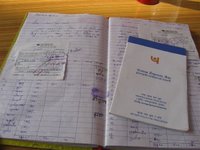A son is of utmost importance. He continues the family line. A daughter on the other hand is a liability. Dowries have to be paid to get her married (a motorbike if the prospective grooom has a year 11 education and a Maruti car if he has a year 12 education) and then there's the cost of the wedding (minimum 50 000 rupees) that is borne by the family of the bride - not exactly affordable for people predominantly engaged in subsistence agriculture. Strange that in Africa it is the other way round and it is the groom that pays lobola for the bride?
There is a strange paradox here between technology and thousand year old mind sets. Foeticide is a HUGE problem here. Women will use technology available to determine the sex of their unborn child and terminate the pregnancy if it is not a male. A colleague that has spent a lot of time working in the area speculated that the average rural women has up to three terminations during her lifetime. As a result Haryana has one of the most disparate men/women population ratios.
A concept unique to India and incredibly effective is that of Self Help Groups (SHGs). NGO driven groups of rural women create a savings scheme together. Monthly they contribute anything from 10 to 100 rupees (about R15). This money is reinvested in financing income generating activities such as candle making or stitching. In addition, the fund provides collateral for women to get loans from microfinance institutions. Women can also take loans from the fund thus circumventing the need to sell their soul to the rapacious village money lender.

The SHG provides morale support to the women but also a high level of accountability - the average default rate for these loans is less than 2%! You may have read aboout SHGs recently as the founder of Grameen Bank, a microfinance institution in Bangladesh, won the 2006 Nobel Peace Prize.
As the structure has proved successful it has garnered the all important support of the village men and the rest of the community. SHGs have empowered women financially but more importantly allowed them to become decision makers in their communities.
It is to these women that we are providing further income generating opportunities. We took two phone prototypes with us. Many of the men in the communities have used mobile phones but up to now, the women have been denied access to them. The look of complete delight when two of the women spoke to each other on the phone (a mere two metres apart!) was the highlight of my day.




No comments:
Post a Comment